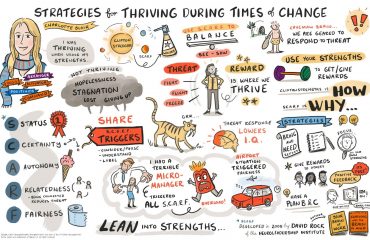
Teaching the Team to Fish with CPORT
Delegation isn’t just about lightening your workload; it’s about empowering your team to thrive. The age-old metaphor, “Give a person a fish, and you feed them for a day; teach them how to fish, and you feed them for a lifetime,” beautifully encapsulates the essence of effective delegation. When managers delegate well, they don’t just hand over tasks—they equip their teams with the skills and confidence to tackle future challenges independently. Enter CPORT, a step-by-step guide to delegation with a strengths-based lens.
Let’s imagine Sarah, a team member with CliftonStrengths like Achiever, Responsibility, and Relator, Ideation and Strategic being handed the task of creating a weekly marketing plan and posting on social media. Sounds simple, doesn’t it? But for many leaders, delegation triggers a whirlwind of concerns and doubts.
- What if Sarah misses something?
- What if the posts don’t reflect the brand’s tone?
- What if the campaign underperforms?
These fears often prevent managers from delegating effectively. But when we embrace delegation through the CliftonStrengths philosophy, we can unpack these fears and understand the real cost of withholding trust and responsibility.
Why Some People Struggle to Delegate
Delegation requires trust, which is often easier said than done. Letting go of control and allowing others to take ownership can feel risky, especially for leaders driven by certain CliftonStrengths themes or shaped by past experiences. Here’s a closer look at why delegation can feel so challenging:
- High Achiever or Maximizer: People with these themes often thrive on quality and efficiency. The thought process is simple: “It’s quicker and better if I do it myself.”
The challenge lies in trusting that someone else’s “good enough” can meet your high standards—or even surpass them. Letting go can feel like compromising on excellence, even though it opens the door for growth. - Deliberative or Analytical: Those with these themes are naturally cautious and detail-oriented, which is a strength in itself. However, their meticulous nature can lead to overthinking: “What if something goes wrong? Have all the risks been considered?”
The fear of missed details or potential errors can create a reluctance to pass the reins, even when the person they’re delegating to is capable of handling the task. - High Responsibility: For someone with Responsibility high, the weight of accountability can feel overwhelming: “If it’s not done perfectly, I’m still the one who has to answer for it.” This theme drives reliability and dependability but can also lead to a tendency to overcommit. Delegating feels like relinquishing control over the outcome, which can clash with their innate sense of duty.
- Past Failures: A history of poor delegation experiences—whether due to unclear instructions, missed deadlines, or subpar outcomes—can leave scars.
“The last time I handed this off, it didn’t go well. I can’t take that risk again.”
These experiences often result in micromanagement, where tasks are technically handed off but still tightly controlled, leaving no room for the other person to truly grow.
The Cost of Not Delegating
When managers hesitate to delegate, they unknowingly stifle the growth of their team and themselves:
- Team burnout: High achievers in the team may feel overburdened when tasks are disproportionately hoarded at the managerial level.
- Stunted development: Delegation provides opportunities for others to grow their strengths. Without these, potential remains untapped??.
- Managerial overload: By holding onto too much, managers risk burnout and reduced strategic focus. You are doing all the fishing!!
Using CPORT ensures clarity, trust, and a strengths-based approach:
C – Context
Provide the history of what has been done so far and the “why” to connect the task to the bigger picture.
Example: “Sarah, this week we need to drive engagement across our social channels. This is part of our broader goal to build community trust and expand our reach. Your role is crucial because you know our audience better than anyone.”
Metaphor: Show Sarah the lake (the purpose) and why this particular fishing spot matters.
P – Purpose
Clearly outline what the task is for, who it’s for and keeping linking the big picture and why it’s important.
Example: “The goal is to create three posts aligned with our brand voice. To show clients the new product and how it can help them. By Friday, we’ll measure success based on likes, comments, and shares.”
Strengths Insight: Ask Sarah how her strengths can help. For instance, her Achiever may thrive on measurable goals, but consider her other tasks to avoid overloading her.
O – Outcomes
Define success while leaving room for creativity.
Example: “Success could include posts showcasing our values or a fun behind-the-scenes snapshot. Sarah, I trust your judgment on what resonates best. I would love to hear the ideas you have”
Metaphor: Teach Sarah to fish by showing her how to cast the net while letting her choose the bait.
R – Resources
Equip Sarah with the tools, guidance, and support she needs to succeed. Tools can be systems and connecting to other people, she might need.
Example: “Here’s the content calendar in the shared drive, You can sue Canva or Adobe and there is a folder of past top-performing posts. Jim in digital can help with access. Let me know if you need guidance, but I’d love to see your take first.”
Strengths Insight: Her Relator might shine by seeking feedback from teammates, and resources ensure she’s not casting into an empty lake.
T – Timeline
Set clear deadlines, how long the task might take, when it is due by and and agree on check-ins (not check-ups!).
Example: “When suits you to review drafts? Final posts should be ready by Friday noon (adjust for time zones).”
Strengths Insight: With Achiever, Sarah will appreciate milestones to check off and clarity on expectations.
The Impact of CPORT
Effective delegation through the CPORT framework does more than just tick items off your to-do list. It transforms the way your team operates, empowering individuals like Sarah to thrive while freeing you to focus on what matters most.
The Positive Ripple Effects of CPORT
- Confidence and Growth:
When Sarah is trusted with meaningful tasks and equipped with clear guidance, her confidence soars. She gains autonomy to make decisions, sharpening her problem-solving skills and learning to navigate challenges on her own. Over time, she becomes a more capable and self-assured contributor, ready to take on bigger responsibilities. - Engagement:
Delegation isn’t just about handing over work; it’s about showing your team that their contributions matter. By involving Sarah in projects tied to larger goals, she feels valued and sees how her efforts make a difference. This fuels her motivation and engagement, making her more invested in her work and the success of the team. - Reduced Managerial Overload:
Letting go can feel daunting, but the payoff is significant. When you trust Sarah to manage tasks like the weekly marketing plan, it frees you to focus on strategic priorities, long-term planning, or other high-value areas. Instead of being bogged down by details, you have the bandwidth to steer the ship.
The Cost of Not Delegating
Failing to delegate effectively can lead to a range of negative consequences for both the team and the leader:
- Missed Potential:
Without opportunities to stretch her skills, Sarah’s creativity and strengths remain dormant. Her Relator talent might have helped build deeper connections with the audience, or her Achiever could have driven innovative approaches to content. But when she’s sidelined or micromanaged, these strengths are left untapped. - Micromanagement:
Holding onto tasks out of fear or mistrust keeps Sarah from growing. Instead of building confidence, she may feel stifled or undervalued. Meanwhile, you stay stuck in the weeds, distracted by minutiae and unable to focus on the big picture. Over time, this dynamic can lead to disengagement—for both you and Sarah.
Building a Culture of Delegation
Delegating with CPORT creates a win-win scenario. Sarah thrives as she steps into her potential, gaining confidence and skills, while you reclaim your time to focus on leading effectively. But the impact goes far beyond the immediate task. Effective delegation fosters a culture of trust, development, and collaboration where every team member feels empowered to contribute their strengths.
Gallup research shows that teams thrive when individuals can do what they do best every day. Delegating through a strengths-based lens brings powerful outcomes:
- Engagement: People feel valued and motivated when their talents are utilised.
- Trust: Handing over responsibility strengthens relationships and builds confidence.
- Collaboration: Delegation becomes an opportunity to create synergy, not just offload tasks.
By using CPORT, you’re not just assigning work—you’re teaching your team to fish. This approach isn’t just about meeting today’s challenges; it’s about building a stronger, more capable team for the future. With the wisdom of CliftonStrengths guiding the way, delegation becomes an investment in people, unlocking their potential to lead, innovate, and thrive.




